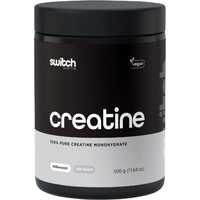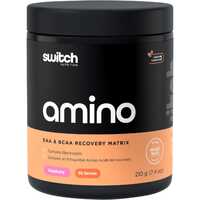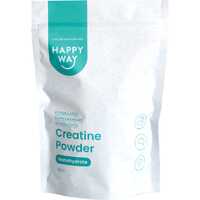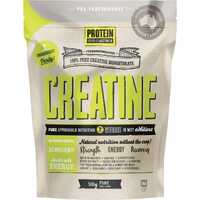Creatine, naturally present in your muscle cells, plays a pivotal role in the production of energy during rigorous activities like heavy lifting or high-intensity exercise [1]. This substance, integral for boosting strength, endurance, and performance, is particularly favoured by athletes for its profound effects on power and muscle mass[1]. Specifically, creatine monohydrate, the most researched and cost-effective form of this supplement, stands out for its efficiency in enhancing workout outcomes and supporting muscle recovery [1].
Interestingly, while your body synthesizes about half of its creatine needs through the liver, kidneys, and pancreas, the rest is obtained from dietary sources, primarily protein-rich foods like red meat, seafood, and animal-derived products [2]. This blend of internal production and nutritional intake underscores the importance of creatine monohydrate not just as a staple in your fitness regime for improved athletic performance, but also as a critical component of your nutrition for sustained energy and strength gains [1][2].
What is Creatine Monohydrate?
Understanding Creatine Monohydrate:
What It Is: Creatine monohydrate stands as a dietary supplement renowned for its ability to enhance muscle performance during short-duration, high-intensity resistance exercises such as weightlifting, sprinting, and bicycling [2]. It's the go-to form of creatine supplement, available in various forms including powders, tablets, capsules, liquids, and energy bars [2].
Composition and Function:
- Amino Acids: This supplement is a concoction of three amino acids - glycine, arginine, and methionine, which play a pivotal role in its effectiveness
- Energy Production: At its core, creatine monohydrate is instrumental in the creation of ATP (Adenosine Triphosphate), the primary energy source for muscle cells This is crucial for activities requiring quick bursts of energy.
Storage and Concentration:
- Muscle Tissue Storage: A significant portion of the body's creatine, approximately 88-90% by weight in the supplement form, is stored within muscle tissue, making it readily available for energy production during physical exertion
- Supplementation Effect: By increasing phosphocreatine stores in your muscles, creatine monohydrate supplementation aids in the formation of ATP, thereby providing the energy needed for heavy lifting and high-intensity exercise
Safety and Popularity:
- Well-Researched and Recommended: Among the various forms of creatine supplements, creatine monohydrate is the most studied, recommended, and popular due to its effectiveness and safety for use in healthy adults [4][9].
- Sporting Approval: It's noteworthy that creatine monohydrate is not considered a banned substance by any sport-governing body, underscoring its acceptance in the athletic community [4].
Additional Insights:
- Dietary Sources: Besides supplementation, creatine is naturally found in foods like milk, fish, mollusks, and both red and white meat, providing a dietary source of this potent amino acid [8].
- Role in Cellular Metabolism: Beyond muscle performance, creatine plays a critical role in cellular metabolism, especially during metabolically stressed states, illustrating its importance beyond just physical exertion [11].
This section highlights the multifaceted benefits and the critical role of creatine monohydrate in enhancing athletic performance, muscle growth, and overall cellular metabolism, presenting it as a valuable supplement for those looking to improve their physical capabilities and energy production during high-intensity activities.
Benefits of Creatine Monohydrate in Athletic Performance
Creatine monohydrate, recognized for its profound impact on athletic performance, offers a spectrum of benefits that cater to a variety of sports and activities. Here's a closer look at how it enhances performance across different dimensions:
Strength and Power:
- Creatine supplementation leads to significant improvements in muscle strength and sport performance, benefiting both trained and untrained individuals alike [13].
- It has been shown to augment increases in muscle mass and strength during resistance training, thereby enhancing performance in competitions [16].
- Specifically, creatine monohydrate supplementation consistently enlarges the pool of intracellular creatine, amplifying the cell’s ability to resynthesize ATP. This intracellular expansion is associated with performance outcomes such as increases in maximal strength, maximal work output, power production, and sprint performance [14].
Endurance and Recovery:
- Creatine supplementation can improve stamina and endurance, helping individuals maintain prolonged focus and energy during intense activities
- It may also speed up recovery time between bouts of intense exercise by mitigating muscle damage and promoting the faster recovery of lost force-production potential [14].
- Benefits include enhanced muscle force recovery after eccentrically-induced muscle damage, making it a valuable asset for athletes looking to maintain high performance levels with reduced risk of sport-related injuries [15].
Specific Athletic Activities:
- Positive ergogenic effects have been observed in activities requiring short bursts of high-intensity effort, such as rowing, jumping, and soccer [4].
- Creatine supplementation improves performance measures like repeated sprint speed and jump height in intermittent sports involving high-intensity exercise [16].
- While its effects on endurance sports may not be as pronounced, with the right training, creatine loading enhances an athlete's ability to perform tasks requiring short bursts of power (less than 30 seconds in duration) [8].
This detailed exploration underscores the versatile benefits of creatine monohydrate in boosting athletic performance across a broad spectrum of activities, making it an indispensable supplement for athletes aiming for peak performance and recovery.
Creatine Monohydrate for Muscle Growth and Recovery
Creatine supplementation, especially creatine monohydrate, plays a crucial role in muscle growth and recovery, offering numerous benefits for those engaged in regular exercise. Here's how it works:
Muscle Strength and Growth:
- Creatine supplementation has been shown to significantly improve muscle strength in both younger and older adults. It is most effective when combined with exercise aimed at building muscles [4].
- By increasing the water content in muscles, creatine monohydrate causes muscles to swell, a process that may contribute to muscle growth [2].
- The supplementation fills up muscle creatine stores, ensuring a constant supply of creatine for ATP re-synthesis, necessary for muscle contraction and growth
- Creatine alters cellular pathways leading to new muscle growth, such as boosting the formation of proteins that increase muscle fiber size and raising levels of insulin-like growth factor 1 (IGF-1), which are essential for muscle development [10].
Recovery and Injury Management:
- Creatine supplementation aids in workout routines by providing quick bursts of energy and increased strength, which can improve recovery times [2].It has been employed as a nutritional strategy to assist individuals in recovering from injuries and managing chronic diseases, highlighting its therapeutic benefits beyond muscle enhancement [11].
- The supplement supports greater neuronal ATP resynthesis, offering cognitive advantages for tasks reliant on the frontal cortex. This is particularly beneficial in conditions of sleep deprivation or menopausal-related muscle and bone strength decreases, as it reduces inflammation and oxidative stress [12].
Effectiveness Across Age Groups:
- While creatine supplements are known to increase muscle growth in individuals aged 18 to 30 when paired with exercise, their effectiveness in those older than 65 or those with muscle-affecting diseases is less clear [2][13].
- In a normal diet containing 1-2 g of creatine per day, muscle creatine stores are about 60-80% saturated. Supplementation serves to increase these stores by 20-40%, offering a significant boost in creatine availability for muscle performance and recovery
These points underscore the multifaceted benefits of creatine monohydrate for muscle growth and recovery, making it an invaluable supplement for individuals across various age groups and fitness levels.
Health Benefits Beyond Muscle Performance
Creatine monohydrate's benefits extend well beyond enhancing muscle performance, offering significant advantages for brain function and overall health. Here's a closer look at these benefits:
Brain Health and Cognitive Function
- Memory and Reasoning in Older Adults: Creatine supplements may improve brain function in individuals aged 60 and older, enhancing short-term memory, reasoning, and offering neuroprotection [2].
- Neurological Conditions: It has neuroprotective effects in conditions like traumatic brain injury, Huntington's Disease, amyotrophic lateral sclerosis, cerebral ischemia, and Parkinson's Disease, where it reduces tissue damage and cognitive decline [21].
- Mood and Mental Well-being: Particularly beneficial for women, creatine supplementation can improve strength, exercise performance, mood, and cognitive functions, potentially aiding in the management of depression and anxiety symptoms [5][12].
Metabolic Health and Energy Levels
- Blood Sugar Management: Creatine may lower blood sugar levels by enhancing the function of GLUT-4, which transports blood sugar into muscles, thereby supporting glucose management and insulin sensitivity [10]
- Fatigue Reduction: It has been shown to reduce fatigue and tiredness, boosting daily energy levels through increased ATP generation, which is crucial for maintaining stamina and mental alertness throughout the day [10]
- Improved Metabolism: Creatine supplementation may increase insulin sensitivity and enhance fat metabolism, even in non-athletes, contributing to better overall metabolic health [12]
Support for Chronic Conditions
- Immunomodulatory Effects: Creatine supplementation may modulate the immune system, offering potential benefits in reducing inflammation and supporting the body's defence mechanisms [21].
- Support for Neurological Diseases: It provides protective benefits in Parkinson’s Disease by preventing a significant drop in dopamine levels and may slow disease progression in other neurological conditions [10][21].
- Aid in Depression Treatment: Increasing brain creatine concentrations has been linked to improved mood and support in treating depression, especially noted in females who experience higher depression rates [12].
Creatine monohydrate, through its multifaceted benefits, not only supports muscle growth and athletic performance but also plays a crucial role in enhancing brain health, metabolic functions, and providing support for managing chronic health conditions.
How to Use Creatine Monohydrate Effectively
To use creatine monohydrate effectively and harness its benefits, here's a structured approach:
Starting with Creatine Supplementation
- Recommended Dosages: Begin with a daily intake of 3-5 g, or 0.1 g/kg of body mass. This dosage is well tolerated and effective for most individuals [22].
- Loading Phase (Optional): For rapid results, a loading phase of 20-25 grams daily, divided into 4 or 5 servings, can be undertaken for 5-7 days. This method quickly maximizes muscle stores of creatine [6].
Maintenance and Cycling
- Post-Loading Maintenance: After the loading phase, reduce the intake to a maintenance dose of 3-5 grams daily. This helps maintain high creatine levels in the muscles [6].
- Cycling Creatine: Some users prefer cycling creatine by taking it for eight weeks followed by a two-week break. This method can help maintain the body's responsiveness to creatine
Best Practices for Consumption
- Timing and Mixing: Creatine can be consumed at any time of the day, mixed with pre or post-workout drinks, breakfast porridge, or smoothies. The exact timing (morning or afternoon) does not significantly impact its effectiveness
- Hydration: It's crucial to drink plenty of water when supplementing with creatine, especially right after workouts for optimal absorption and effectiveness [19].
- Consultation for Special Cases: While creatine is safe for many, individuals with conditions like renal issues, diabetes, or pregnant and breastfeeding women should consult a healthcare provider before starting supplementation [20].
By following these guidelines, users can optimize the benefits of creatine monohydrate for muscle growth, recovery, and overall performance enhancement.
Conclusion
Throughout this comprehensive exploration, we've delved into the multifaceted world of creatine monohydrate, uncovering its significant benefits across enhancing athletic performance, promoting muscle growth and recovery, and extending its advantages to brain health and overall metabolic functioning. The evidence presented not only reaffirms creatine monohydrate as a powerhouse supplement for athletes and fitness enthusiasts but also highlights its potential implications for cognitive health and chronic disease management, making it a noteworthy consideration for a broader audience.
As we conclude, it's imperative to underscore the importance of adopting an informed approach to creatine supplementation, tailored to individual needs and health conditions, to fully leverage its wide-ranging benefits. While creatine monohydrate stands out for its safety, efficacy, and versatility, prospective users should always consider professional advice to optimize its integration into their health and fitness regimes. The journey through the science and real-world applications of creatine monohydrate underscores its role not just in enhancing physical performance but in contributing to a holistic approach to health and well-being.
FAQs
What are the main advantages of using creatine monohydrate?
Creatine monohydrate is known for providing energy to muscles and potentially enhancing brain health. It is commonly used to boost strength, elevate performance, and maintain cognitive sharpness. Extensive research supports the use of creatine supplements, which are generally considered safe for the majority of individuals.
Is daily consumption of creatine monohydrate safe?
Taking creatine monohydrate every day in lower doses, such as 4-5 grams, for up to 18 months is considered safe. Long-term usage is also possibly safe, with doses up to 10 grams daily for as long as five years having been used without significant issues. However, some side effects like dehydration, stomach upset, and muscle cramps may occur.
How much creatine is sufficient for muscle building?
To maintain muscle creatine stores, a daily intake of approximately three to five grams (about 14 mg per pound or 30 mg per kg of body weight) is recommended. This dosage is effective for both men and women and does not depend on one's level of physical activity or athletic prowess.
Can I consume 20 grams of creatine in a single dose?
While 20 grams of creatine can be consumed in one go, it is typically advised to spread the intake throughout the day, such as taking 5 grams four or five times per day. Some individuals might tolerate a single 20-gram dose or two 10-gram doses well, but most research supports smaller, more frequent servings. Personal tolerance should guide dosage frequency and amount.
References
[1] - https://www.healthline.com/nutrition/what-is-creatine
[2] - https://my.clevelandclinic.org/health/treatments/17674-creatine
[4] - https://www.webmd.com/vitamins/ai/ingredientmono-873/creatine
[5] - https://www.webmd.com/vitamins-and-supplements/creatine
[6] - https://www.healthline.com/nutrition/creatine-loading-phase
[8] - https://www.usada.org/spirit-of-sport/education/athletes-need-know-creatine/
[9] - https://www.nerdfitness.com/blog/what-is-creatine-how-to-start-supplementing-with-creatine/
[10] - https://www.healthline.com/nutrition/10-benefits-of-creatine
[11] - https://www.ncbi.nlm.nih.gov/pmc/articles/PMC7910963/
[12] - https://www.youtube.com/watch?v=1cawqGRtfU4
[13] - https://www.ncbi.nlm.nih.gov/pmc/articles/PMC8949037/
[14] - https://www.ncbi.nlm.nih.gov/pmc/articles/PMC8228369/
[15] - https://jissn.biomedcentral.com/articles/10.1186/1550-2783-6-13
[16] - https://www.mysportscience.com/post/creatine-and-performance
[17] - https://www.healthline.com/nutrition/creatine-exercise-performance
[19] - https://www.health.com/creatine-7109306
[20] - https://www.ncbi.nlm.nih.gov/pmc/articles/PMC5753968/
[21] - https://www.ncbi.nlm.nih.gov/pmc/articles/PMC4915971/
[22] - https://jissn.biomedcentral.com/articles/10.1186/s12970-021-00412-w


 Certified Organic
Certified Organic Vegan Friendly
Vegan Friendly  Vegetarian
Vegetarian Organic Ingredients
Organic Ingredients Dairy Free
Dairy Free Gluten Free
Gluten Free Keto Friendly
Keto Friendly


































